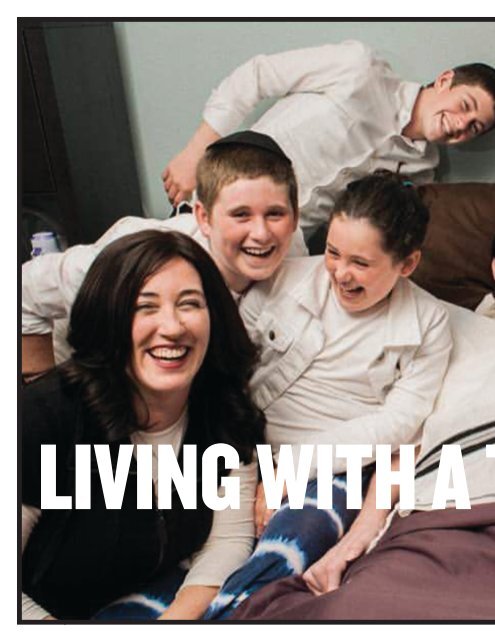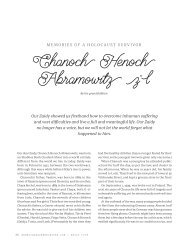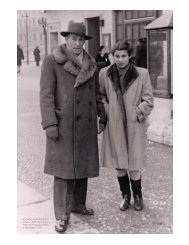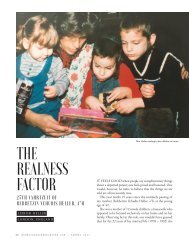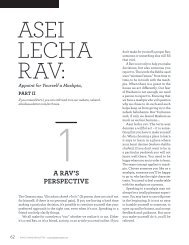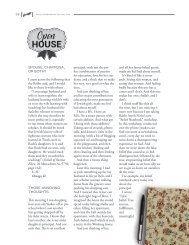You also want an ePaper? Increase the reach of your titles
YUMPU automatically turns print PDFs into web optimized ePapers that Google loves.
LIVING WITH A T<br />
8 NSHEICHABADNEWSLETTER.COM
TICKING CLOCK<br />
Dina <strong>Hurwitz</strong><br />
FEBRUARY 2016<br />
9
BEFORE MY HUSBAND YITZI got sick, our lives were simple<br />
yet challenging. Temecula, California, is a bit off the beaten<br />
path. It’s where many good hard-working people live, and it was<br />
hit very hard in the housing crash. Like most Shluchim, money<br />
was tight for us, and to pay for our children’s chinuch, Yitzi worked<br />
three jobs. We didn’t get to see him much during the week, but<br />
Shabbos was our special time together. Our four older children<br />
(then ages 10-15) lived in Los Angeles during the week and came<br />
home for Shabbos. The three younger ones were in school in San<br />
Diego, an hour’s drive away. We struggled to make ends meet, yet<br />
we loved our Shlichus. The community eventually grew out of our<br />
living room and into a nice storefront, and not a day went by that<br />
we didn’t discuss our dream of buying a larger and more permanent<br />
home for Chabad of Temecula.<br />
One Shabbos afternoon, Yitzi told me that something weird<br />
was going on with his tongue. He was trying to speak and the<br />
words were sounding slurred. I assumed it was the all-nighters<br />
he was pulling and told him that perhaps this was his body’s way<br />
of telling him that he needed to sleep like normal people do. He<br />
rearranged his schedule so he would be home at night and at first<br />
that seemed to work, until it didn’t. We went to the doctor, who<br />
took some tests and told us that Yitzi had a severe sinus infection.<br />
After we completed one round of antibiotics and nothing<br />
changed, they took a CAT scan and said they needed to be more<br />
aggressive with the medication because the infection was still<br />
there. This was between Rosh Hashanah and Yom Kippur. By Succos<br />
we knew there was a bigger problem. The neurologist said it<br />
could be one of four things. This list included ALS, short for Amyotrophic<br />
Lateral Sclerosis, also known as Lou Gehrig’s disease, a<br />
progressive neuromuscular disease.<br />
He explained that ALS is a unique disease. There is no test to<br />
determine if that is what you have. If the symptoms meet the criteria,<br />
and you have ruled out all other possibilities, then that is<br />
what you have. It took another month to determine that it’s not<br />
the other three. From there we went to a neuro-muscular specialist.<br />
It took a month just to get an appointment and another<br />
two for them to officially diagnose Yitzi. From the first doctor’s<br />
visit until the diagnosis was six months. By that time, his speech<br />
was so much worse, people sometimes thought he was drunk. His<br />
left side was beginning to show muscle degeneration, but to the<br />
untrained eye, he was still perfect and beautiful. It was impossible<br />
to detect the storm raging inside.<br />
I was a wreck. I couldn’t eat or sleep or think about anything<br />
else. I was frozen. Yitzi, always the optimist, assured me, “Hashem<br />
is good and He will take good care of us.”<br />
Yitzi’s father had just had a very serious heart attack and we<br />
were afraid to tell him. Every day there was someone else’s heart<br />
to break.<br />
In the beginning, I didn’t understand people’s intense reactions.<br />
He is my husband, it is my pain! Why are you crying? After<br />
my sister-in-law told me about my brother’s reaction, I realized<br />
that we all love Yitzi, and we are all devastated by this.<br />
The evening of the diagnosis, we had planned a birthday farbrengen<br />
for Yitzi, that we were hoping would be a seudas hoda’ah.<br />
It ended up being a most beautiful show of love and brotherhood.<br />
Over 200 Shluchim came from quite far away, and this is when<br />
the <strong>Hurwitz</strong>familyfund was born. Yitzi walked out for a few minutes<br />
and Rabbi Simcha Backman told everyone to put his number<br />
into their phones and right now text him what they would give<br />
monthly. I know I don’t need to remind you that Shluchim do<br />
not have a lot of extra and everyone gave and continues to give<br />
with an open hand.<br />
My second biggest fear was rapidly approaching. It was time<br />
to tell the children. That is probably one of the hardest things for<br />
a parent to do. The kids were shocked; their father is superman.<br />
He never even gets a cold, and there is nothing he cannot do. The<br />
first few days were like a bad dream. Kind of blurry with a lot of<br />
group crying sessions.<br />
WRITINGS OF RABBI YITZI<br />
HURWITZ FROM HIS BLOG,<br />
YITZIHURWITZ.BLOGSPOT.COM<br />
Thursday, September 17, 2015<br />
With Togetherness<br />
In this week’s parshah, Vayelech, we have<br />
the mitzvah of hakhel. “Assemble the<br />
nation, the men, the women, the children...<br />
In order that they hear and in order that<br />
they learn and fear Hashem..., and will be<br />
careful to do all the words of this Torah.”<br />
All the Jewish people would assemble.<br />
The king, standing on a podium built for<br />
the occasion, would read selections from<br />
sefer Devarim, including the Shema, for all<br />
to hear.<br />
While most mitzvos are given without the<br />
reason, here the Torah lists the reasons: in<br />
order that they hear, learn, fear Hashem<br />
and keep the Torah.<br />
...How is the mitzvah of hakhel done<br />
today? Any time this year, gather your family<br />
or friends or community. The goal is to<br />
strengthen our feelings towards Hashem<br />
and the Torah.<br />
The prerequisite is that you are “assembled,”<br />
meaning all of you are in a state<br />
of togetherness, with brotherly love.<br />
“Togetherness” sets the mood and opens<br />
the heart to hear words of meaning and<br />
encouragement, “in order that they hear...”<br />
Words are powerful; when used correctly<br />
they can lift up a spirit, but when abused,<br />
they can destroy.<br />
Our children and spouses ache for our<br />
recognition and love. With so much to<br />
do, mitzvos, davening, cooking, cleaning,<br />
etc., they could be ignored or, worse, mistreated,<br />
in our need to have things perfect.<br />
When I started to lose my ability to speak,<br />
it made me aware of the power of speech.<br />
I had to decide what is truly worth saying.<br />
Now, unable to speak, I dream of what I<br />
10 NSHEICHABADNEWSLETTER.COM
Over the next year, Yitzi gradually lost his ability to walk, talk,<br />
eat, drive, play with the kids, sing, dance, and play guitar. It seemed<br />
like it was slow but all of sudden he was in the wheelchair 24 hours<br />
a day. All of the things related to the mouth went first. By mid-2013<br />
I was the only one who could understand him. It took so much concentration<br />
to understand every word. My brain was so tired and<br />
I had a constant headache. When I could no longer understand<br />
him I felt like a failure as a wife. How is it possible that I have no<br />
idea what is going on in his head?<br />
I am very grateful for technology.<br />
After losing his speech, my<br />
husband used his iPhone to communicate.<br />
Every month was worse<br />
than the one before. It was a year<br />
of constant loss and readjustment.<br />
Anyone dealing with a degenerative<br />
disease knows exactly what<br />
I mean. I felt guilty every time it<br />
got worse for not appreciating the<br />
week before when it was a little better.<br />
I was fearful all the time, with<br />
each adjustment wondering if I<br />
would have the strength to always<br />
make sure my husband’s dignity is<br />
preserved no matter how undignified<br />
the situation gets.<br />
I never recall Yitzi complaining<br />
about the steady stream of losses.<br />
He just always did what he could<br />
with a smile.<br />
The first Chanukah after the<br />
diagnosis, in December of 2013, I<br />
wrote this on my blog (thecaffeinatedthinker.blogspot.com):<br />
Photo Credit JEM/The Living Archive ID 66826<br />
We all prepared the menorahs with so much joy and excitement.<br />
We love Chanukah. I watched Yitzi prepare his<br />
menorah, shine it, set it up, and light the shamash. Suddenly<br />
his joy turned to confusion, now what? He could no longer<br />
speak, and no longer sing the brachos. I quickly turned to our<br />
oldest son and said, “Please make the brachah with Tatty.”<br />
A moment of surprise, followed by a moment of grief, then<br />
a beautiful smile and with his head held high, he made the<br />
would tell them, if I could.<br />
You first need to see them as most<br />
important. Don’t be so religious that your<br />
family will suffer. Don’t ram Yiddishkeit<br />
down their throats. Rather, bring them<br />
close with love and kindness.<br />
They value your words and remember<br />
them. Your actions are equally (if not<br />
more) important. Create a loving atmosphere,<br />
focus your attention on them.<br />
Listen to what they have to share with you.<br />
They want you to know them, and to be<br />
proud of them.<br />
When you have set a loving atmosphere,<br />
then you can tell them about how Hashem<br />
has chosen us to be His. Their ears and<br />
their hearts will be open to hear and to<br />
learn, to fear Hashem and to keep His<br />
Torah.<br />
If I could talk, I would tell my kids how<br />
much I love them and how proud I am of<br />
them. How lucky we are to be Hashem’s<br />
children, and the Rebbe’s soldiers.<br />
I would tell them to be kind and to use<br />
their talents and gifts to serve Hashem and<br />
to lift others up.<br />
I would tell them to smile a lot and be<br />
positive. There is nothing better than helping<br />
or making another Jew happy, even if it<br />
means taking a loss.<br />
I would tell my daughters how pretty they<br />
look in their Yom Tov outfits. I would tell<br />
my boys to tuck their shirts in.<br />
What would I tell my wife? Now, that is<br />
none of your business.<br />
Consider making a hakhel get-together<br />
with your family and friends. Create an<br />
atmosphere of togetherness, speak to<br />
their hearts with love and kindness. Most<br />
important, make your spouse and children<br />
feel most important of all.<br />
Thursday, August 7, 2014<br />
Marriage Tips for Men, Part I<br />
Here are a few small and easy things that<br />
will make your life better.<br />
1) When she does or says something<br />
hurtful, which will happen, just forget what<br />
she said or did. Women get emotional and<br />
sometimes irrational. But be careful; she<br />
will never forget anything you do “wrong.”<br />
2) Before you criticize her, ask yourself if<br />
it really matters in the long run, or perhaps<br />
you are better off letting this one slide.<br />
3) Be ready and happy to go to<br />
FEBRUARY 2016<br />
11
counseling. Even and especially in the first<br />
year. Better deal with a small issue now<br />
and learn to get along, than a huge unfixable<br />
problem later. Simply put, what makes<br />
sense to you may sound silly to her and vice<br />
versa, because women think in a totally different<br />
way. Counseling can help.<br />
4) Find ways to make her laugh every<br />
day. Women think too much and they need a<br />
rest from their brain chatter. Laughter gives<br />
them rest from it. She will appreciate it.<br />
5) Never raise your voice. It affects<br />
women with an instinct to be afraid, flee<br />
and protect themselves and the children.<br />
You will have a hard time getting back<br />
to normalcy. You might not realize that<br />
among men we raise our voice a lot. It’s<br />
hard to change gears. We yell to make a<br />
point. Women only yell if they are angry.<br />
When your voice goes up they register “he<br />
is angry at me.”<br />
6) Compliment her every day. Find things<br />
to honestly compliment. It could be something<br />
she did. Something she is wearing.<br />
Let her know that you notice and value her.<br />
7) Buy her flowers. Sending flowers says<br />
a lot. It says I like you. It says I am thinking<br />
of you. It says I appreciate you. It says you<br />
are beautiful to me. It says you are a princess<br />
who deserves pretty things. It says,<br />
Although״ I’m a guy and flowers that will die<br />
in a week are the biggest waste of money<br />
and make absolutely no sense, you are still<br />
more than worth it to me.” If you are low<br />
on cash buy one flower or, even better, pick<br />
some wild flowers.<br />
8) Ignore statements such as, “You don’t<br />
have to buy me a gift for my birthday.” Buy<br />
her a gift.<br />
9) Treat her with respect. Do chivalrous<br />
things. Open the door for her. Take her<br />
coat. Make sure she has a seat. Bring her<br />
tea in a pretty cup and sit with her and listen.<br />
Let her feel taken care of. Make her<br />
feel like a princess. Every woman wants to<br />
feel like a princess. Of course you won’t<br />
be able to do it all the time, but do it often<br />
enough that she knows.<br />
10) When she gets dressed nicely, take a<br />
moment and notice and tell her how pretty<br />
she looks. She spent a lot of time and<br />
energy getting dressed. Let her know that<br />
you appreciate her. Learn these words...<br />
Pretty, Elegant, Classy,<br />
12 NSHEICHABADNEWSLETTER.COM
Please daven for a refuah sheleimah for Yosef Yitzchak<br />
ben Bracha. Rabbi <strong>Hurwitz</strong> asks readers, in the zchus<br />
that he should have a refuah sheleimah, to please try to<br />
overcome arguments and to show love to one another,<br />
especially to your family.<br />
To contribute financially to the family, visit hurwitzfamilyfund.com.<br />
To read Rabbi Yitzi <strong>Hurwitz</strong>’s weekly<br />
divrei Torah, visit yitzihurwitz.blogspot.com. One reader,<br />
Esther, left this comment on Rabbi <strong>Hurwitz</strong>’s blog: I<br />
always feel hopeful rather than sad when I read your<br />
blog. You are a leader despite your extreme physical<br />
limits. Obviously you lead in your family, I can<br />
hear it in Dina’s words. And you lead in our Lubavitch<br />
community by showing us how to behave and how<br />
to think when serious hardship strikes. I don’t often<br />
comment on your writings but I try to internalize<br />
your message. I want you to know how helpful you<br />
are to people you have never met: I work in a Jewish<br />
neighborhood, close to many hospitals. I hear<br />
about others’ trials and worries daily. Sometimes I<br />
have no words to say, I am silenced by the enormity<br />
of what my fellow Yid is facing. That’s when I “whip<br />
out Yitzi.” I share a video of you speaking Yud Shvat<br />
where you say “don’t be afraid, Hashem is with you.”<br />
Or I simply share that you are in the matzav that you<br />
are, and yet you believe and you trust and you continue<br />
to daven to Hashem. That is inspiration enough.<br />
If Yitzi can continue to put his love and his trust in<br />
Hashem, devote his koach to learning and spreading<br />
Torah, how must we behave? And as you say in your<br />
posts, Hashem is unlimited and in YOUR zchus, may<br />
He fulfill his promise to us and bring Moshiach Now!<br />
brachah with (for) his father. Almost the same voice, the same tune,<br />
and the same smile. At the first opportunity, I ran to my room to fall<br />
apart. All I could think of was how much we had lost. I cried half of<br />
Chanukah (at least), until I finally caught myself. I refocused on all<br />
we still have and all we have gained. It was a monster of an effort,<br />
but it worked.<br />
A year later, Chanukah again. Comparing this year to last, wondering<br />
why I didn’t appreciate what we had. I had a husband who could walk, and<br />
dance, and light the menorah. We were not bed-bound, he could communicate<br />
with his phone. Is there a way to skip the first part, where I cry for<br />
days, and just focus on the amazing blessings we still have?<br />
The day after Rosh Hashanah of 2014, Yitzi was rushed to the hospital<br />
with pneumonia. While he was there, he had a tracheotomy done. We<br />
knew it was coming but didn’t know how soon. At that time, he lost the<br />
use of his right hand which was how he communicated and how he controlled<br />
his wheelchair. He was now confined to bed with a feeding tube,<br />
a nurse 24 hours a day, and no way to communicate. Rabbi Yonasan and<br />
Natanya Abrams took over Chabad of Temecula. Yitzi and I are grateful to<br />
them for their hard work, and we take pride in their success and growth.<br />
Again, thank G-d for technology. This is when Yitzi learned to use<br />
the Tobii, the eye gaze computer. It was a very hard time. Since then, he<br />
has mastered the communicating, writes regularly on his blog, yitzihurwitz.blogspot.com,<br />
and spends hours a day with visitors. His body has<br />
not changed in the last year.<br />
We have a tremendous support group, and I have Yitzi. When Yitzi<br />
got sick, I thought we had left a maximum of two years together. One<br />
particularly hard day, it occurred to me that I can choose how we spend<br />
whatever time we have left. I can cry daily and yell at G-d or I can live like<br />
Yitzi wants me to: enjoy every second we have and make Yitzi proud. I<br />
cannot honestly say I have succeeded fully, but I try daily, and every day<br />
is a new chance. In the process I have found out that being happy is a<br />
choice and when you do choose happiness, nobody loses out.<br />
Yitzi, on the other hand, does not struggle like I do. He has an<br />
Amazing , Gorgeous , Exquisite , Stunning,<br />
Breathtaking.<br />
Try to use the right one at the right time.<br />
This is by no means finished. I hope to<br />
continue with more. Hope it brings a positive<br />
change to your marriage.<br />
Monday, February 9, 2015<br />
Marriage Tips for Men, Part II: How<br />
to Listen<br />
One of the biggest complaints women<br />
have about their husbands is: “He doesn’t<br />
listen.”<br />
The problem is that men have no idea<br />
what women mean when they say that.<br />
The first thing you need to know is that<br />
women have a natural need to be understood.<br />
When they feel understood they<br />
feel loved. They will even tell their best<br />
friend, “I really feel like he understands<br />
me.” Translation: “I feel loved.”<br />
This is difficult for men to understand<br />
because men don’t have a natural need to<br />
be understood. Becoming a good listener<br />
takes a lot of patience and effort and the<br />
reward is tremendous.<br />
The next thing to understand is that,<br />
being natural listeners, women get<br />
extremely frustrated when you don’t listen.<br />
That makes for an unhappy wife, and<br />
you don’t want to go there.<br />
The reward for becoming a good listener<br />
is a happy wife and a deep, close and meaningful<br />
relationship. She will become your<br />
strongest advocate and stay by your side<br />
through thick and thin.<br />
Listening is understanding her from her<br />
perspective. To do this, first you need to<br />
put aside your way of thinking and experience<br />
her feelings from her perspective.<br />
This way you really get to know her, not<br />
your understanding of her, but her understanding<br />
of her.<br />
Listening is more than hearing words.<br />
Women say a lot without talking. They use<br />
facial expressions, body language, clothing<br />
and self-care to express themselves and<br />
they expect you to notice.<br />
Women are detail oriented. They especially<br />
notice things that are wrong or out<br />
of place. For example, she could be all<br />
made up and dressed to the nines. You see<br />
an amazing, flawless sight. All she sees is a<br />
small pimple that appeared on her chin.<br />
Men see the big picture but miss the<br />
FEBRUARY 2016<br />
13
unshakable belief in Hashem and<br />
a strong connection to the Rebbe.<br />
It has always been his dream to<br />
be the Rebbe’s soldier, and he is<br />
still able to be that. I don’t know<br />
why people react to pain the way<br />
they do, but I do know that Yitzi<br />
has always been my whole world<br />
and he still is. He was always so<br />
good at showing me how much<br />
he cares for me and respects me<br />
and now I get to show him.<br />
L-R: Childhood<br />
photo of the<br />
brothers Shalom,<br />
Dovid, and Yitzi<br />
<strong>Hurwitz</strong>.<br />
One of the biggest blessings we have is living next door<br />
to Yeshiva Ohr Elchanan Chabad. As Yitzi lost his ability to<br />
speak, Friday night became a bit depressing for me. So I asked<br />
Rabbi Avremi Schochet if he could send us three bachurim on<br />
Friday nights to sing Shalom Aleichem and Eishes Chayil. For<br />
the rest of that year those three came every Friday night. They<br />
brought such joy to our home.<br />
Slowly, the group of three grew into a group of ten to 20 sitting<br />
around Yitzi’s bed, singing and bringing boundless joy into<br />
the house. Eventually, they borrowed a sefer Torah from a nearby<br />
sofer and bought us a small aron kodesh. They lein for Yitzi every<br />
Shabbos and whenever leining is called for. They also come an<br />
hour before the end of Shabbos and enjoy seder niggunim, farbrengens,<br />
and stories. They come on their breaks and learn with<br />
Yitzi; they learn with our children and take them on outings;<br />
they have become family to us. One learned how to settle Yitzi<br />
in the wheelchair and another learned how to suction him in<br />
case a nurse comes late. We have a Gemara class in Yitzi’s room<br />
two or three times a week. My son and his friends do Chitas with<br />
Yitzi a few times a week as well. We are surrounded with love all<br />
of the time. The ones who left after the schoolyear ended stay<br />
in touch with Yitzi still. As Yitzi wrote:<br />
Over the past two years I’ve been watching my abilities, talents<br />
details.<br />
Listening requires noticing details and putting<br />
the clues together to form a conclusion.<br />
At minimum you should notice that something<br />
is wrong or that something is different.<br />
Then you will be able to ask what is wrong or<br />
what is different. Don’t be clueless.<br />
Here are some tips for good listening.<br />
1) Set times for listening.<br />
Make it a habit that the first five minutes<br />
after you come home is a time for listening.<br />
Ask your wife how her day was. Imagine<br />
how good she will feel, knowing that she is<br />
first on your mind when you come home.<br />
A good time for listening is after the children<br />
are asleep but if she is too tired at that<br />
time, do it earlier. It is okay for the kids to see<br />
you together talking, it will be a valuable lesson<br />
and will give them a sense of stability.<br />
The main thing is that you set times that<br />
work for the two of you, and that you keep<br />
them. Your wife will look forward to being<br />
with you at that time.<br />
“I don’t have the time” and “I’m too busy”<br />
are not acceptable excuses–make the time.<br />
2) All she wants is for you to listen and<br />
understand, that’s it. Refrain from sharing<br />
your suggestions, opinions, or advice, they<br />
are not relevant to her feelings. Just listen<br />
and understand.<br />
3) Women change every day, so every day<br />
there is more to tell. There are also deeper<br />
parts of herself to share.<br />
What you heard yesterday is not enough<br />
today. There are new facets discovered<br />
today that need to be shared. There are<br />
also new things going on in her life.<br />
4) When you are listening, look at her.<br />
Notice her expressions and body language.<br />
Every so often, give her a subtle hint to let her<br />
know that you understand. It could be a nod<br />
or a soft sound. This will let her know that<br />
you are paying attention. If you don’t, she will<br />
assume you didn’t understand and feel she<br />
has to repeat herself. She will get aggravated<br />
and complain, “He doesn’t listen.”<br />
5) You are not required to be listening all<br />
the time but when you are supposed to be<br />
listening, do it correctly.<br />
Be focused and pay attention. Remove<br />
distractions, put away your cell phone and<br />
teach the children not to disturb you at this<br />
time. Let her feel like you are totally there<br />
for her, you are interested in knowing her.<br />
It is my hope that you put these tips to<br />
the test, and that that this contributes<br />
to your wife’s happiness. Her happiness<br />
14 NSHEICHABADNEWSLETTER.COM
and gifts slip away, wondering: What is the purpose of living<br />
if I am not able to do these things? The answer became clear<br />
as people started to visit. With nothing to give of my talents,<br />
I was left with raw love and joy towards the visitors, and that<br />
apparently came through more powerfully than all the talents.<br />
Honestly, none of us knows how much time we have in the<br />
world. My family just has a clock ticking near us louder. It makes<br />
us value the time we have and the things we do, the things that<br />
are important. We try to make whatever time we have left as joyful<br />
as possible. Sometimes, when you see somebody in a situation<br />
like ours, it reminds you to do the same in your life.<br />
Why do some people fall apart and others seem to handle<br />
whatever Hashem gives them? I think the answer is love. When<br />
someone is loved and feels intense love for another, there is nothing<br />
they cannot do. When one is lonely, even the smallest obstacle<br />
can be too much to handle.<br />
I am the one who gets queasy when I see a loose tooth, and<br />
I have had to do all sorts of medical things. There is nothing<br />
I won’t do for Yitzi. What would be too hard would be living<br />
without the person I love. The greatest gift Hashem can give<br />
us is to love someone. It changes you into the best possible<br />
version of you.<br />
One day I will write a book. It will be called A. L. S. - A Love<br />
Story. |<br />
Yitzi with his parents at his wedding to Dina Berkowitz (L-R): Mrs. Bracha <strong>Hurwitz</strong>,<br />
Yitzi, Reb Shmuel <strong>Hurwitz</strong>.<br />
will surely contribute to your happiness.<br />
Happy wife, happy life.<br />
___<br />
Sunday, September 13, 2015<br />
Dear Dina, my heart of gold,<br />
This year has been difficult. Your tears<br />
didn’t go unnoticed. I’m sure the tears I saw<br />
were only the tip of the iceberg. How many<br />
were shared with your pillow, how many<br />
were shed while writing in your blog and<br />
how many have you held back?<br />
Who can understand the heart of a Jewish<br />
mother? It is like a sixth sense, only<br />
Jewish women have it. It is a closeness to<br />
Hashem, as if you can sense His sadness as<br />
well. Sometimes you sense His joy.<br />
This is talked about in the last mishnah<br />
in Sanhedrin. That on Yom Kippur, the<br />
girls would go dancing in the vineyards,<br />
just like Tu B’Av. What was special about<br />
those times? They are times of forgiveness<br />
of sins, and the girls could sense<br />
Hashem’s joy, which caused them to feel<br />
joy, which caused them to go out and<br />
dance.<br />
Now, if women can sense Hashem’s joy, it<br />
would follow that they sense His sadness<br />
as well. And so you cry even more.<br />
I think the deepest crying is for the children.<br />
I think this is why you identify so<br />
strongly with the haftorah of the second<br />
day of Rosh Hashanah. Rochel is crying<br />
for her children and there is nothing to<br />
console her. It just seems endless, with<br />
no reprieve in sight. So much work, so<br />
much selfless giving and giving, with no<br />
gain, no reward.<br />
The haftorah continues. Hashem says,<br />
you can stop crying, there is reward for<br />
your work. There is hope, the children will<br />
return to their borders, Moshiach is coming<br />
and it’s your work, your tears, your love<br />
and your joy that brought him.<br />
Your suffering is not in vain. You will see<br />
the fruits of your hard work and you will be<br />
honored.<br />
I don’t know why Hashem chose us, but<br />
He did. We, like Rochel, won’t give up and<br />
we won’t let Him down.<br />
In this week’s parshah we read the<br />
words from Moshe to Yehoshua, “Chazak<br />
v’ematz!” Be strong and courageous. Perhaps<br />
it is our bitachon, simchah and<br />
emunah that will bring an end to this dark<br />
galus.<br />
I am with you,<br />
Your Yosef Yitzchak<br />
FEBRUARY 2016<br />
15


